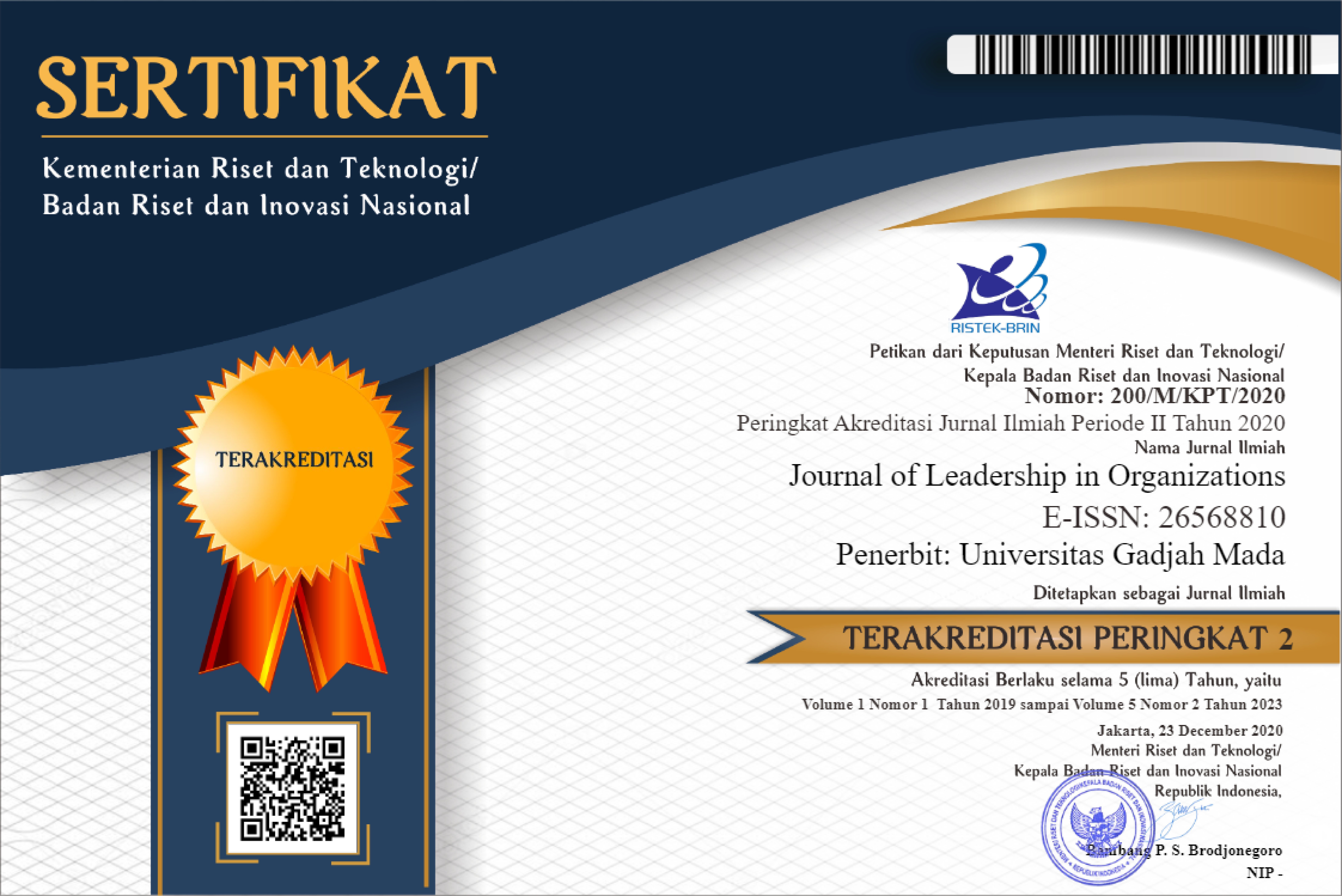THE INFLUENCE OF SPIRITUAL LEADERSHIP ON AFFECTIVE COMMITMENT THROUGH CALLING AND MEMBERSHIP (A STUDY AT ZAINAB MOTHER AND CHILD HOSPITAL IN PEKANBARU)
Nageeta Tara Rosa(1*), Djamaludin Ancok(2)
(1) Magister Management, Faculty of Economics and Business, UGM
(2) Fakultas Psikologi Gunadarma
(*) Corresponding Author
Abstract
Keywords
Full Text:
PDFReferences
Allen, N.J., and J.P. Meyer. (1990) The Measurement and Antecedents of effect, Continuance and Normative Commitment to the Organization. Journal of Occupational Psychology. 63(1): 1–18.
Becker, H. S. (1960). Notes on the concept of commitment. American Journal of Sociology, 66, 32−40.
Cooper, D. R., & Schindler, P. S. (2014). Business Research Methods, 12th edition. McGraw Hill Education; New York.
Fabiene, Essono E., and Sandeep Loyd Kachchhap. (2016). Determinants of Employee ’ s Commitment among Healthcare Professionals. International Journal of Academic Research in Accounting, Finance and Management Sciences.
Fry, Louis W. (2003). Toward a Theory of Spiritual Leadership. Leadership Quarterly, 14(6):
693–727.
Fry, Louis W., Steve Vitucci, and Marie Cedillo. (2005). Spiritual Leadership and Army Transformation: Theory, Measurement, and Establishing a Baseline. Leadership Quarterly, 16(5): 835–62.
Fry, Louis W., and John W. Slocum. (2008). Maximizing the Triple Bottom Line through Spiritual Leadership. Organizational Dynamics, 37(1): 86–96.
Fry, Louis W., John R. Latham, Sharon K. Clinebell, and Keiko Krahnke. (2016). Spiritual Leadership as a Model for Performance Excellence: A Study of Baldrige Award Recipients. Journal of Management, Spirituality and Religion, 14(1): 22–47.
Fry, Louis W., and Yang, Mari. (2018.) The Role of Spiritual Leadership in Reducing Healthcare Worker Burnout. Journal of Management, Spirituality and Religion, 15(4): 305–24.
Ghozali, Imam (2016). Aplikasi Analisis Multivariate dengan Program IBM SPSS 23. Badan Penerbit Universitas Diponegoro. Edition 8, 45-52, 91-159.
Hair, Joseph F., William C. Black, Barry J. Babin, and Rolph E. Anderson. (2014). Multivariate Data Analysis. Pearson Education Limited, Seventh Edition.
Hunsaker, W.D. (2017). The ROI of Employee Engagement in Hospitals. Retrieved from https://www.qnnect.com/blog/the-roi-oef-employee-engagement-in-hospitals, accessed by 25 September 2018.
INFOBPJS Kesehatan. (2016). Optimalkan Peran Pemda dalam Pogram JKN- KIS 42th edition. Media Eksternal BPJS Kesehatan; Indonesia.
Mansor, Norudin, Ahmad Haziq Ismail, Mohd Afifie Mohd. Alwi, and Nurhani Anwar. (2013). Relationship between Spiritual Leadership and Organizational Commitment in Malaysians’ Oil and Gas Industry. Asian Social Science, 9(7): 179–91.
Maxwell, John C. (1999). The 21 Indispensable Qualities of A Leader: Becoming The Person Others Will Want to Follow. Nashville: Thomas Nelson Publishers.
Meyer, John P., Natalie J. Allen, and Catherine A. Smith. (1993). Commitment to Organizations and Occupations: Extention and Test of a Three-Part Conceptualization. Journal of Applied Psychology, 78(4): 538–51.
Michael Page Malaysia. (2015). 2015 Employee Intentions Report Indonesia (Electronic Version). Michael Page, 24.
Mueller, R. (2017). The ROI of Employee Engagement in Hospitals. https://www.qnnect.com/blog/the-roi-oef-employee-engagment-in-hospitals accessed by 25/09/2018
Mwangi, Grace W. (2015). Factors Influencing Commitment and Engagement of Healthcare Workers at Kenyatta National Hospital. University Of Nairobi.
Organ, D.W. (1997). Organizational citizenship behaviour: It’s Construct Clean-Up Time. Human Performance, Vol. 10, pp. 85–97.
Rumah Sakit Ibu dan Anak Zainab. (2018). Retrieved from https://rsiazainab.co.id, accessed by 1 October 2018.
Saripudin, W. And Rosari, R. (2018). Pengaruh Kepemimpinan Spiritual pada Work Engagement Melalui Kebermaknaan Kerja dan Keanggotaan: Studi Pada Rumah Sakit Islam Yogyakarta PDHI. Yogyakarta: Library of Gadjah Mada University.
Saripudin, W. And Rosari, R. (2019). Does spiritual leadership model enhance work engagement? Empirical evidence from an islamic hospital in yogyakarta. Journal of Leadership in Organizations. 1(2), 112-133.
World Health Organization Report. (2006). Working together for health. Retrieved from http://www.who.int/whr/2006/whr06en.pdf, accessed by 5 October 2018.
Article Metrics
Refbacks
- There are currently no refbacks.
Copyright (c) 2020 Journal of Leadership in Organizations

This work is licensed under a Creative Commons Attribution-ShareAlike 4.0 International License.
| Journal of Leadership in Organizations |
| Journal of Leadership in Organizations (JLO), with registered number ISSN 2656-8829 (Print) and ISSN 2656-8810 (Online), is published by the Center for Leadership Studies, Department of Management, Faculty of Economics and Business, Universitas Gadjah Mada. The content of this website is licensed under a Creative Commons Attribution-ShareAlike 4.0 International License |
| © 2019 Journal of Leadership in Organizations | |





_logo2.png)


.png)




